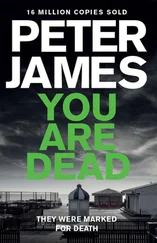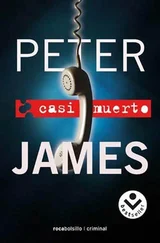Peter James - Perfect People
Здесь есть возможность читать онлайн «Peter James - Perfect People» весь текст электронной книги совершенно бесплатно (целиком полную версию без сокращений). В некоторых случаях можно слушать аудио, скачать через торрент в формате fb2 и присутствует краткое содержание. Жанр: Триллер, на английском языке. Описание произведения, (предисловие) а так же отзывы посетителей доступны на портале библиотеки ЛибКат.
- Название:Perfect People
- Автор:
- Жанр:
- Год:неизвестен
- ISBN:нет данных
- Рейтинг книги:4 / 5. Голосов: 1
-
Избранное:Добавить в избранное
- Отзывы:
-
Ваша оценка:
- 80
- 1
- 2
- 3
- 4
- 5
Perfect People: краткое содержание, описание и аннотация
Предлагаем к чтению аннотацию, описание, краткое содержание или предисловие (зависит от того, что написал сам автор книги «Perfect People»). Если вы не нашли необходимую информацию о книге — напишите в комментариях, мы постараемся отыскать её.
Perfect People — читать онлайн бесплатно полную книгу (весь текст) целиком
Ниже представлен текст книги, разбитый по страницам. Система сохранения места последней прочитанной страницы, позволяет с удобством читать онлайн бесплатно книгу «Perfect People», без необходимости каждый раз заново искать на чём Вы остановились. Поставьте закладку, и сможете в любой момент перейти на страницу, на которой закончили чтение.
Интервал:
Закладка:
At two-thirty she had a meeting at UCLA film school. It was now twenty past twelve. Her car was at home, but she needed to go via the office to pick up some material. A twenty-five-minute drive, if the traffic wasn’t too bad. She needed about half an hour there to put some stuff together. Then allow thirty minutes to the film school. Not much of a margin left; she hated to be late when she was working.
‘What an asshole that guy is!’ John said angrily, finally breaking the long silence between them since they had left Dr Rosengarten’s office. ‘What a total fucking asshole.’
Naomi said nothing. At five she was meant to be having a drink at the Four Seasons with a journalist friend who worked for Variety. She couldn’t cancel, but how the hell was she going to get through the afternoon? She lowered her window. The gust of air, even laden with petrol fumes, felt good, better than the smell of the interior, of warm, old plastic. John inched forward. A tractor-trailer rumbled past them.
His cellphone rang. She was grateful that he killed the call. Moments later her own phone rang. She switched it off, with a tinge of guilt, knowing it was probably someone from the office but not able to deal with a work conversation at this moment.
‘Are you thinking what I’m thinking?’ she said, finally.
‘He’s wrong.’ John tramped the gas pedal, making a more violent turn than he had intended, pulling out inches in front of a bus, which blasted its horn in anger.
‘He has to be wrong,’ she agreed.
‘No one can know for sure at twelve weeks,’ he said. ‘It was dumb of him to claim he could.’
‘He’s arrogant. He doesn’t care about us, we’re little people. If you or I were A-list celebs, he wouldn’t have made that mistake. He wouldn’t have dared.’
The bus filled John’s rear-view mirror as they crossed San Vincente and Wilshire. ‘His mind wasn’t on it.’
‘We should get a second opinion.’
John negotiated the junction with Olympic in silence, then he said, ‘We’ll get one. He’s an asshole, he’s made a mistake. Sixteen weeks is the earliest you can tell, all the books say that. We’ll go and see someone again when you are sixteen weeks.’
‘I don’t want to wait four weeks – I can’t wait that long, John, I have to know. We have to know.’
‘There’s stuff on the net about a blood test called free foetal DNA, but I’m not sure how reliable it is. It may not be possible – to be totally accurate – until sixteen weeks. I don’t think we should panic.’
‘I’m worried,’ Naomi said. ‘If the sex is wrong, the other genes might also be wrong. There must be some one hundred per cent accurate way we can check on the sex without waiting a month. Surely? What about a DNA test – wouldn’t that be a possibility?’
‘Other than this free foetal method, it’s invasive to do that. I looked up a load of stuff on the web the other day about testing foetuses. There’s a risk of miscarriage. It’s a small risk, but – do you want to take any chances?’
Did she? Any chances? She tried desperately to think straight. If Rosengarten had made a mistake, it would be crazy to risk everything by panicking. But ‘If it comes to it, we’ll fly back to the clinic. Confront Dettore.’
‘You think Dettore would tell us the truth? You think if he’s made a mistake he’s going to admit it to us?’
John started to say something, then fell silent for some moments. Then he said, ‘He – he doesn’t have any reason-’
Swallowing back a knot of fear in her throat, she said, ‘Reason to what?’
‘To give us a girl when we’ve asked for a boy.’
‘Phone him,’ she said. ‘You have his number, phone him now.’
They were less than half a mile from home, but John pulled off the road onto the forecourt of the small shopping mall. He looked up the number on his BlackBerry then, holding the phone to his ear, dialled.
Naomi watched his face. After some moments, he said, ‘This is John Klaesson. I need to speak to Dr Dettore very urgently. Please ask him to call me back on my cellphone.’ He gave the number, then he hung up.
‘Voice mail?’ she asked.
‘Yes.’ John looked at his watch. ‘They’re on East Coast time – which means they’re three hours ahead. It’s twenty after twelve. Twenty after three on the ship. Maybe there’s some problem with the switchboard. I had this difficulty getting hold of him a few times in the past.’
‘I didn’t see any switchboard on the ship, John.’
He wedged the phone back into the cradle. ‘There’s a lot of things we didn’t see.’
She said nothing.
16
When he was eighteen, John had to make a decision that would shape the course of his life. He had already decided he wanted to make a career in academic research, but had a hard time deciding which field. He was torn between his love of biology and his fascination with mathematics, physics and technology.
There was something mystical to him about all mathematical problems. Sometimes he felt he was reaching out through time into some new, as yet undiscovered dimension, to meet an intellectual challenge placed by a vastly superior intelligence. As if each of these big problems was part of some cosmic puzzle, and if you could solve them, you would understand the key to human existence.
In biology, also, were keys to the riddle of existence, but they were more limited. The world of genetics excited him, but ultimately genetics boiled down to mechanics. It seemed to him that genetics could help you understand everything about a human being, except for the one key question that had fascinated John all his life: why do we exist? Ultimately he found biologists too narrow in their thinking. Relatively few biologists believed either in the notion of God or any higher form of intelligence. He found far broader thinking among mathematicians and physicists, and that was ultimately the reason he opted to study computer sciences.
But when he began at Uppsala, Sweden’s premier university, he hadn’t realized that, despite the exploding technology revolution, life for most academic researchers was not changing, and that when he went out into the real world afterwards, he would be faced with a constant struggle for funding. If you weren’t employed by a corporation or an institute, the research programme you were on would likely have funding for a limited period, often as short as just three years. This effectively meant that instead of concentrating on your research, you had to put a huge amount of energy into writing letters to companies, institutes, foundations, and filling in applications, trying to find your next tranche of funding.
This was where John was at again now. He’d stayed on at Uppsala doing his PhD, then as a postdoc, but ultimately found Sweden too limiting – as well as disliking the short daylight hours of winter there. At the age of twenty-six he had jumped at the opportunity to relocate to Sussex University in England, to a lecturing post that gave him the opportunity to work in a lab as part of a research team in cognitive sciences. It was headed by a man he considered to be a real visionary, Professor Carson Dicks, under whom he had worked when the scientist had spent a year as a visiting lecturer at Uppsala.
John enjoyed the science they were doing at Sussex and working under Carson Dicks so much, he didn’t mind that the pay was poor, but he was depressed by the indifferent attitude in Britain towards research. Then, after three years, Dicks left the university to take a post at a government research establishment. Shortly after, at the age of twenty-nine, John was offered the chance of a tenure track faculty lecturing post at the University of Southern California, with his own lab in a department headed by Dr Bruce Katzenberg – another scientist whose work he admired hugely. He jumped at it.
Читать дальшеИнтервал:
Закладка:
Похожие книги на «Perfect People»
Представляем Вашему вниманию похожие книги на «Perfect People» списком для выбора. Мы отобрали схожую по названию и смыслу литературу в надежде предоставить читателям больше вариантов отыскать новые, интересные, ещё непрочитанные произведения.
Обсуждение, отзывы о книге «Perfect People» и просто собственные мнения читателей. Оставьте ваши комментарии, напишите, что Вы думаете о произведении, его смысле или главных героях. Укажите что конкретно понравилось, а что нет, и почему Вы так считаете.











